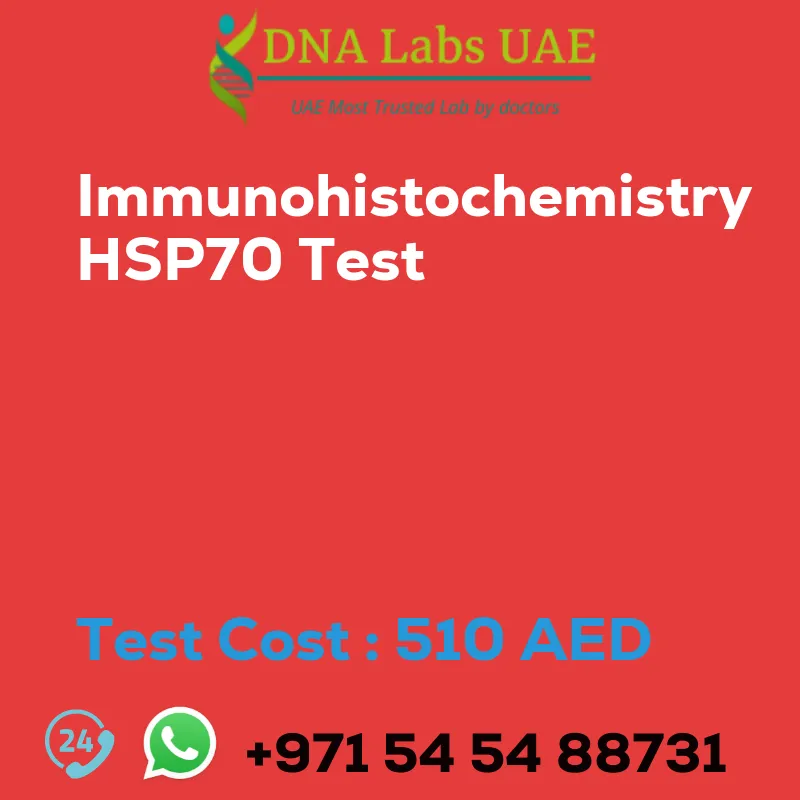IMMUNOHISTOCHEMISTRY HSP70 Test
Cost: AED 510.0
Test Name: IMMUNOHISTOCHEMISTRY HSP70 Test
Components: Immunohistochemistry
Price: AED 510.0
Sample Condition: Submit tumor tissue in 10% Formal-saline OR Formalin fixed paraffin embedded block. Ship at room temperature. Provide a copy of the Histopathology report, Site of biopsy and Clinical history.
Report Delivery: Sample Daily by 6 pm; Report Block: 5 days, Tissue Biopsy: 5 days, Tissue large complex: 7 days
Test Type: Cancer
Doctor: Oncologist
Test Department: HISTOLOGY
Pre Test Information: Provide a copy of the Histopathology report, Site of biopsy and Clinical history.
Test Details
The HSP70 test is an immunohistochemistry (IHC) test used to detect the presence of heat shock protein 70 (HSP70) in tissue samples. HSP70 is a stress-inducible protein that plays a crucial role in cellular protection and repair mechanisms.
The IHC technique involves the use of specific antibodies that bind to HSP70 protein in tissue sections. These antibodies are usually labeled with a chromogen or a fluorophore, allowing for visualization of the protein under a microscope. The staining intensity and pattern can provide valuable information about the expression and localization of HSP70 in the tissue.
The HSP70 test is commonly used in research and diagnostic settings to investigate various conditions, including cancer, neurodegenerative diseases, and tissue damage. It can help identify cellular stress, assess the response to therapy, and provide insights into disease mechanisms.
To perform the HSP70 test, tissue samples are collected and fixed in formalin. The fixed tissues are then embedded in paraffin and sectioned into thin slices. These tissue sections are mounted on slides and subjected to a series of steps, including deparaffinization, antigen retrieval, blocking, primary antibody incubation, secondary antibody incubation, and visualization.
Finally, the stained slides are examined under a microscope by a pathologist or researcher to interpret the results. The interpretation of the HSP70 test results depends on the specific context and research question. Increased expression of HSP70 may indicate cellular stress, while aberrant expression patterns may suggest disease progression or response to therapy.
The results of the HSP70 test are typically analyzed in conjunction with other clinical and pathological information to guide treatment decisions and prognosis. Overall, the HSP70 test is a valuable tool in immunohistochemistry that helps researchers and clinicians understand the role of HSP70 in various diseases and conditions.
| Test Name | IMMUNOHISTOCHEMISTRY HSP70 Test |
|---|---|
| Components | |
| Price | 510.0 AED |
| Sample Condition | Submit tumor tissue in 10% Formal-saline OR Formalin fixed paraffin embedded block. Ship at room temperature. Provide a copy of the Histopathology report, Site of biopsy and Clinical history. |
| Report Delivery | Sample Daily by 6 pm; Report Block: 5 days Tissue Biopsy: 5 days Tissue large complex : 7 days |
| Method | Immunohistochemistry |
| Test type | Cancer |
| Doctor | Oncologist |
| Test Department: | HISTOLOGY |
| Pre Test Information | Provide a copy of the Histopathology report, Site of biopsy and Clinical history. |
| Test Details |
The HSP70 test is an immunohistochemistry (IHC) test used to detect the presence of heat shock protein 70 (HSP70) in tissue samples. HSP70 is a stress-inducible protein that plays a crucial role in cellular protection and repair mechanisms. The IHC technique involves the use of specific antibodies that bind to HSP70 protein in tissue sections. These antibodies are usually labeled with a chromogen or a fluorophore, allowing for visualization of the protein under a microscope. The staining intensity and pattern can provide valuable information about the expression and localization of HSP70 in the tissue. The HSP70 test is commonly used in research and diagnostic settings to investigate various conditions, including cancer, neurodegenerative diseases, and tissue damage. It can help identify cellular stress, assess the response to therapy, and provide insights into disease mechanisms. To perform the HSP70 test, tissue samples are collected and fixed in formalin. The fixed tissues are then embedded in paraffin and sectioned into thin slices. These tissue sections are mounted on slides and subjected to a series of steps, including deparaffinization, antigen retrieval, blocking, primary antibody incubation, secondary antibody incubation, and visualization. Finally, the stained slides are examined under a microscope by a pathologist or researcher to interpret the results. The interpretation of the HSP70 test results depends on the specific context and research question. Increased expression of HSP70 may indicate cellular stress, while aberrant expression patterns may suggest disease progression or response to therapy. The results of the HSP70 test are typically analyzed in conjunction with other clinical and pathological information to guide treatment decisions and prognosis. Overall, the HSP70 test is a valuable tool in immunohistochemistry that helps researchers and clinicians understand the role of HSP70 in various diseases and conditions. |








